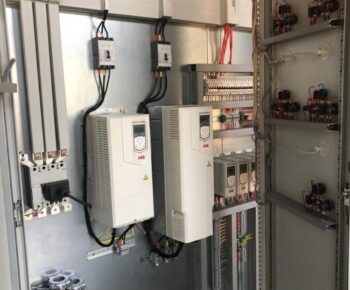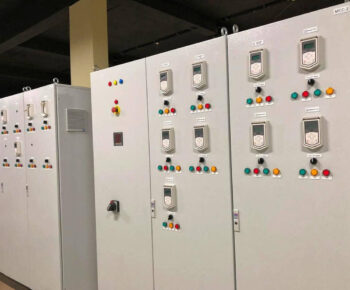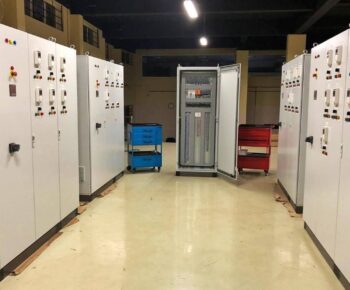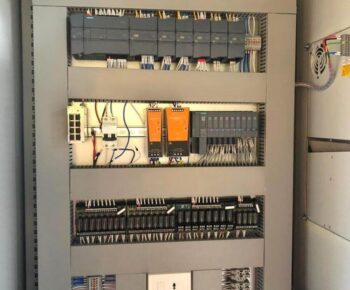Project Name:
A Case Study in Activated Carbon Manufacturing
Enhancing Production Consistency and Quality through Centralized Control and Monitoring of Rotary Kiln for an Activated Carbon Manufacturing Plant
Scope:
Design and Engineering, Supply, Installation and Commissioning of complete Control System including PLCs, Fields Instruments, VFD based MCC Panels and SCADA for Rotary Kiln-Based Activated Carbon factory.
Background:
Activated carbon production is a vital industrial process used in various applications, from air and water purification, gold to pharmaceuticals and more. However, a prevailing issue in many activated carbon factories is the consistent occurrence of error states during production. These errors can lead to variations in the quality and properties of the produced activated carbon, ultimately impacting its efficiency and effectiveness in different applications.
The primary contributors to these error states have been identified as follows:
- Variation in Raw Material Feed Rate: Fluctuations in moisture levels within the raw materials used for activated carbon production can result in inconsistent feed rates. This variation can subsequently lead to disparities in the final product’s characteristics.
- Variation in Steam Quantity: The activation process relies on the controlled application of steam within the rotary kiln. Inaccuracies in the amount of steam applied can cause deviations in the porosity and adsorption capacity of the activated carbon.
- Temperature Variations: The temperature range of 800 to 950 degrees Celsius is crucial for achieving the desired properties of activated carbon. However, inconsistent temperatures within this range can lead to inconsistencies in the final product’s hardness and porosity. In this scenario, the challenge extended beyond solely managing temperature variations within the kiln; it also involved addressing the rotational nature of the kiln itself.
- Variation in Air Quantity: The controlled introduction of air into the kiln is another critical factor affecting the activation process. Irregularities in the air quantity can disrupt the chemical reactions taking place and impact the quality of the activated carbon.
The client utilized a steam-based activation process where charcoal is heated within a rotary kiln to create activated carbon. Steam is introduced to the process to enhance the porosity of the carbon’s surface, thereby optimizing its adsorption capacity.
The primary goal of the production process was to generate activated carbon with both high adsorption capacity and maintained hardness. To achieve consistent and optimal production conditions, the implementation of automation had become a necessity. By stabilizing and controlling the input parameters, the client aimed to minimize errors and deviations during production.
System Description:
A fully automated control system was developed by Consyst spanning from Supply, Installation and Commissioning of Field Instruments, Wireless communication system, PLC Control System, VFD- MCC Package and SCADA.
Instruments included level transmitters for silo level measurement, air and steam flow meters, steam pressure transmitter, thermocouples/ RTDs for temperature measurements and steam control valves for closed loop control of steam line.
The control system included Siemens S7-1200 PLCs, ABB ACS560 VFDs and AVEVA Intouch SCADA
- Base Feed Rate Control:
Material feed was regulated and fed to the weigh feeder via a Rotary valve, allowing synchronized control of both components. The system provided real-time indications for feeder running status, overload status signals, underload status, total material feed in kiln etc.
- Precise Temperature Regulation:
To ensure meticulous temperature management, the kiln was divided into five distinct zones. This segmentation allowed for comprehensive monitoring and accurate recording of temperature variations throughout the kiln. Furthermore, to enhance safety and process integrity, alarms were configured to trigger in the event of both exceptionally high and extremely low temperatures.
The challenge was to integrate real-time temperature data from 5 zones of the kiln to the SCADA system. We utilized RF Wireless technology to transfer temperature data from thermocouples to the SCADA. The wireless component was powered by a battery which ensured continuous operation without any interruptions.
- Steady Steam Flow Regulation:
Our strategy involved maintaining a consistent steam flow rate into the kiln using a combination of a steam flow transmitter (orifice-based DP measurement) and a pressure control valve (electro-pneumatic) working in a closed loop flow control. The system was designed with a controlled pressure limit, effectively maintaining the flow within the range.
Complete Motor Control Center was also a part of the project wherein VFDs were deployed for all Motor starters. Motor speed was also efficiently managed through the SCADA system while in auto mode. Additionally, the flexibility of manual control allows for motor start and stop actions from local control stations.
Continuous silo level, temperature and air flow monitoring was implemented through the control system. To ensure safety and prevent backfires, interlocks were placed.
The entire process was visually represented through a process flow diagram integrated with comprehensive data on SCADA. Data recording was also facilitated for in-depth future studies and analytics.
Result:
- The thorough regulation of raw material feed rates, temperature, and steam levels have ushered in consistent and superior quality carbon generation.
- The automated control system’s seamless operation, coupled with the safety interlocks, has not only improved production efficiency but has also fortified safety measures boosting overall operational excellence.
- Our efforts have marked a significant milestone – the establishment of the first fully automated activated carbon plant in India, all managed seamlessly from the control room.
- The implemented solution is Industry 4.0 ready, simplifying the customer’s ability to roll out digitalization initiatives in the upcoming phase.




